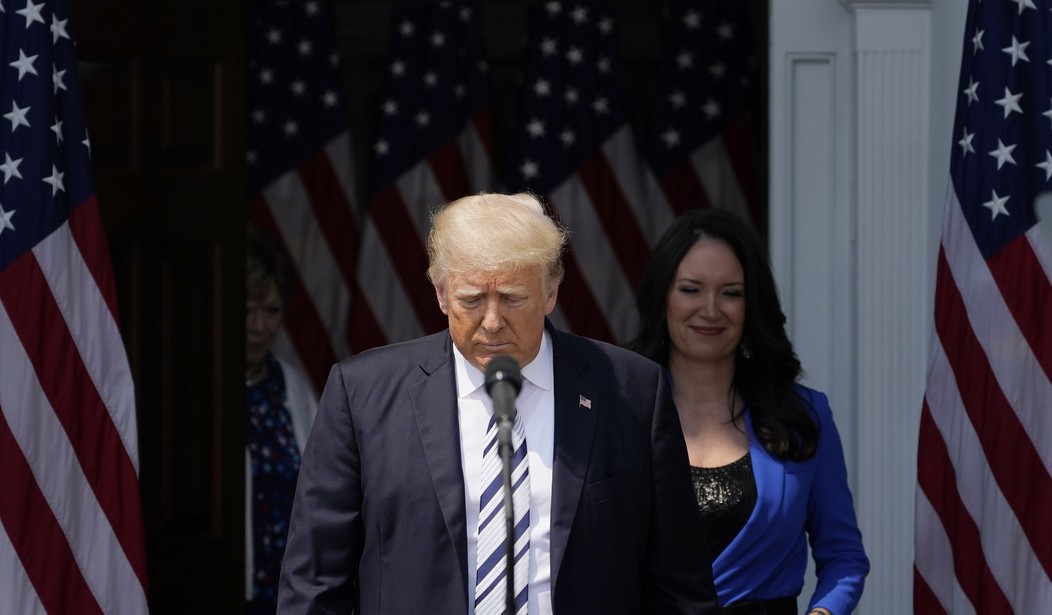Does a former president have the right to invoke executive privilege? Or does that legal status end when his term does? A federal court will enter into that unknown and arcane turf, thanks to a lawsuit filed late yesterday by Donald Trump. Trump wants to block access to his presidential records with a privilege claim, a claim which Joe Biden denied Trump in a break with tradition:
Former President Trump is suing to block the release of documents to the special committee investigating the January 6 assault on the Capitol. pic.twitter.com/enU5XqnyPF
— CBS Mornings (@CBSMornings) October 19, 2021
Former President Donald Trump filed a lawsuit Monday against the Jan. 6 select committee and the National Archives as he seeks to block the release of presidential records related to his communications around the insurrection.
In the lawsuit, Trump’s attorney Jesse Binnall argues the committee “has decided to harass President Trump … by sending an illegal, unfounded, and overbroad records request to the Archivist of the United States.”
Binnall also accuses President Joe Biden of engaging in “a political ploy to accommodate his partisan allies” by refusing to block the release of Trump’s records to the Jan. 6 committee.
“The Committee’s request amounts to nothing less than a vexatious, illegal fishing expedition openly endorsed by Biden and designed to unconstitutionally investigate President Trump and his administration. Our laws do not permit such an impulsive, egregious action against a former President and his close advisors,” Binnall writes.
It’s an interesting case, and it poses an interesting question. Executive privilege does not survive the end of office in an obvious sense: Trump can’t claim it for anything that happened after he left office on January 20. But does a president personally retain the privilege over his records in perpetuity, or does that privilege reside in the office itself?
The answer is almost certainly going to be the latter. As Cornell’s Legal Information Institute succinctly points out, “executive privilege” is a tradition carved out of the separation-of-powers doctrine, not an explicit constitutional grant to those who hold the office. The executive branch cannot intrude into the working papers of members of Congress or the judiciary except in the limited case of criminal investigations, and even that access is limited. (Recall the case of William “Dollar Bill” Jefferson and the successful lawsuit against the FBI over the seizure of his records.) Similarly, the same privilege exists for the executive branch, with the president as its ex officio — but not personal — head. Put another way, it’s the branch that has the privilege; its current leadership invokes it at his/her discretion. [See update below.]
It’s this distinction that created the tradition of current presidents submitting privilege claims on behalf of their predecessors. Until Biden’s refusal, that had been a routine application, even between presidents of opposite parties. That didn’t mean that the claim couldn’t be challenged, but it was generally considered good form — and good precedent by current presidents who might one day need the same favor from their own successors. Biden’s rejection of that precedent might one day backfire on him and his own aides, but it’s clear that his authority as the ex officio head of the executive branch is plenary on this point.
Trump’s lawsuit has two other problems. First, Congress has the constitutional authority to investigate and provide a check on executive authority, which makes the claim that the investigation is somehow “illegal” rather novel. More importantly, these subpoenas are part of an investigation into a crime, one committed against Congress itself in the January 6 riot. Congress has not just constitutional authority but literal legal jurisdiction to investigate that crime, and that provides an exception to executive privilege even if a court determined that former presidents retain the ability to make those claims.
This lawsuit will make for some entertaining debate and nifty lawyering, but Trump and his team had better prepare for a loss. The best they can hope to do is to string out this legal challenge for another 14 months and hope that Republicans take control of the House in January 2023. The January 6 committee will disband at the end of this session of Congress, and it seems highly unlikely that Kevin McCarthy would renew its charter if he takes the speaker’s gavel. If the courts fast-track it, Trump’s team will have to start preparing to spin whatever’s in the archives.
Update: Charlie Savage reminds us that the Supreme Court did allow former presidents to claim executive privilege … at least in theory:
May ex-presidents invoke executive privilege?
Yes, but courts may view their claims with less deference than those of current presidents.In a 1977 case challenging a law related to the control of White House files from the then-former Nixon administration, the Supreme Court said Nixon could make a claim of executive privilege even though he was out of office.
“We reject the argument that only an incumbent president may assert such claims, and hold that appellant, as a former president, may also be heard to assert them,” the court wrote.
It didn’t do Nixon any good, however, as the court ruled in Nixon that his papers could be accessed. But still, this is a murkier question than I originally argued, and Charlie agrees with me that the real goal here is to run out the clock on the committee. He thinks it’s likely to succeed, too.
There's likely enough untested legal issues raised by Trump's claim of executive privilege to keep the House Jan. 6 committee's subpoenas tied up in court through the 2022 midterm. Here's a dissection. https://t.co/1X9XSFB1ah
— Charlie Savage (@charlie_savage) October 19, 2021








Join the conversation as a VIP Member